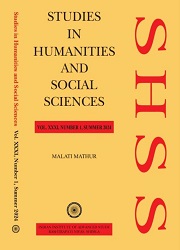Buddhist Precepts and Environmental Worldviews of Tribals
A Case Study of Dongria Kondh in Odisha, India
Keywords:
Buddhism, Tribalism, Environmental Worldview, Ecological Coexistence, Dongria KondhaAbstract
One of the fundamental philosophies of Buddhism is its
inclusiveness. It teaches the right to livelihood, but without killing
or stealing, that ensures co-existence with the environment. These
kinds of environmental worldviews are replicated among many
indigenous communities of India. This paper endeavors to recount
some of these environmental worldviews, very similar to Buddhism,
among the tribal communities of Odisha in India with the help
of a case study of Dongria Kondha tribe. Tribal religious beliefs are
reflected in the form of different rituals. There are allegorical terms
that express a deep sense of unity of the Dongria with nature even
without any literal meaning. Not only their religious life is closely
related to the nature but also the tribal livelihood is characterized
by a profound relationship between their economic life and the
natural environment or habitat, which is generally the forest. In this
manner they become the ultimate preserver of nature and maintains
harmony between humans and the nature.


